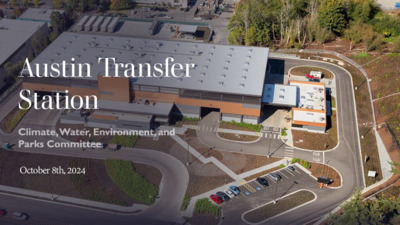Item 005 - Austin Transfer Station Briefing — original pdf
Backup

Austin Transfer Station October 8th, 2024 What Is A Transfer Station? • A facility where solid waste is temporarily collected, sorted, and consolidated before being transferred to larger vehicles for transportation to a landfill, recycling facility, or other final disposal site. Transfer Station Benefits • Reduces GHG emissions • Supports Electrifying Fleet • Provides public disposal opportunities & • Increases storm readiness & operations resiliency • Reduces ARR & City operating expenses reduces blight • Supports City’s Climate Equity Plan • Expands diversion & disposal • Supports ARR Comprehensive Plan opportunities Financial Analysis Factors Consultant reviewed several categories of expenses to evaluate benefit of building a transfer station opposed to direct hauling to disposal facility. Metric Routes Measurement Number of routes eliminated Personnel Reduction in staffing or overtime Vehicles Savings on trucks, fuel, and tolls Construction Capital costs to develop facility including fixed equipment Operating Costs Costs to operate the facility including all personnel costs Site Evaluation Factors • Site Conditions • Operational Cost Efficiency • Potential for Permitting Concerns • Impact on Surrounding Community • Utility Access • Value of Land Parcel • Environmental Justice • Compatibility with CAPCOG Plan • Ease of Vehicle Accessibility • Collection Rate Efficiency The financial viability of a transfer station is largely determined by its proximity to both the new dispatch location at the Northeast Service Center (NESC) and the collection service areas…. Sites…east of I-35 in the north-central and northeast areas are likely to offer stronger financial returns compared to other parts of the City.” - Consultant’s Report Recycle Facility Waste Facility Brush Facility ARR Service Center Compost Facility Sites Evaluated Seattle North Transfer Station Financial Results • Constructing and operating a transfer station would result in an annual cost of approximately $20,000 - $992,000 compared to direct hauling waste prior to accounting for additional revenue from private (non- City) haulers • Breakeven with acceptance of private hauler waste Next Steps September 10, 2025 February 2026 2030 Zero Waste Advisory Commission (ZWAC) Briefing CWEP & ZWAC update on Transfer Station including potential Development Agreement Beginning of FY 2030 Estimated Commencement of Operations City Council Authorization for Property Acquisition City Council Authorization for Development Agreement Fall 2025 Spring 2026 Questions? Richard McHale Director – Austin Resource Recovery 512-974-4301 Richard.McHale@austintexas.gov www.austinrecycles.com